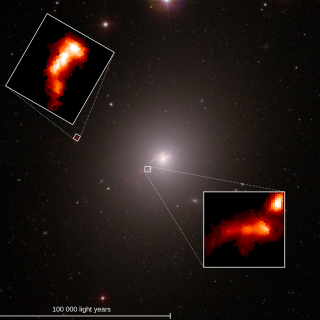It may interest you
-
 An international team of astronomers has captured the most detailed and completed view yet of the mysterious filaments surrounding the giant galaxy M87. Using new observations from the Gran Telescopio Canarias and the Canada-France-Hawaii Telescope, the study reveals how these long, thread-like structures move, evolve, and interact with their galactic environment and the activity of the central supermassive black hole. These findings have just been published in Monthly Notices of the Royal Astronomical Society. M87: a giant galaxy and its mysterious threads M87, located about 55 millionAdvertised on
An international team of astronomers has captured the most detailed and completed view yet of the mysterious filaments surrounding the giant galaxy M87. Using new observations from the Gran Telescopio Canarias and the Canada-France-Hawaii Telescope, the study reveals how these long, thread-like structures move, evolve, and interact with their galactic environment and the activity of the central supermassive black hole. These findings have just been published in Monthly Notices of the Royal Astronomical Society. M87: a giant galaxy and its mysterious threads M87, located about 55 millionAdvertised on -
 The Instituto de Astrofísica de Canarias (IAC) invites the public to visit the Teide Observatory (Izaña, Tenerife) during the weekend of 21 and 22 June, coinciding with the week of the summer solstice. The activity is part of its Open Days, a free science outreach initiative organised by the Observatory itself together with the IAC's Scientific Communication and Culture Unit (UC3). Over two days, those attending will be able to tour some of the most important scientific facilities at the centre, learn how they work from the technical and research staff, and make live solar observations. EachAdvertised on
The Instituto de Astrofísica de Canarias (IAC) invites the public to visit the Teide Observatory (Izaña, Tenerife) during the weekend of 21 and 22 June, coinciding with the week of the summer solstice. The activity is part of its Open Days, a free science outreach initiative organised by the Observatory itself together with the IAC's Scientific Communication and Culture Unit (UC3). Over two days, those attending will be able to tour some of the most important scientific facilities at the centre, learn how they work from the technical and research staff, and make live solar observations. EachAdvertised on -
 A study published today in Nature Astronomy , in which a researcher from the IAC has participated, outlines the discovery of an extremely rare type of binary system composed of two high mass white dwarfs. The two stars are so close together that they will eventually collide resulting in a supernova explosion which, due to its proximity to the Earth, will appear ten times brighter than the Moon. Type 1a supernovae are a class of cosmic explosion often used as "standard candles" to measure the expansion of the Universe. They occur when a white dwarf exceeds the Chandrasekhar mass - the limitAdvertised on
A study published today in Nature Astronomy , in which a researcher from the IAC has participated, outlines the discovery of an extremely rare type of binary system composed of two high mass white dwarfs. The two stars are so close together that they will eventually collide resulting in a supernova explosion which, due to its proximity to the Earth, will appear ten times brighter than the Moon. Type 1a supernovae are a class of cosmic explosion often used as "standard candles" to measure the expansion of the Universe. They occur when a white dwarf exceeds the Chandrasekhar mass - the limitAdvertised on